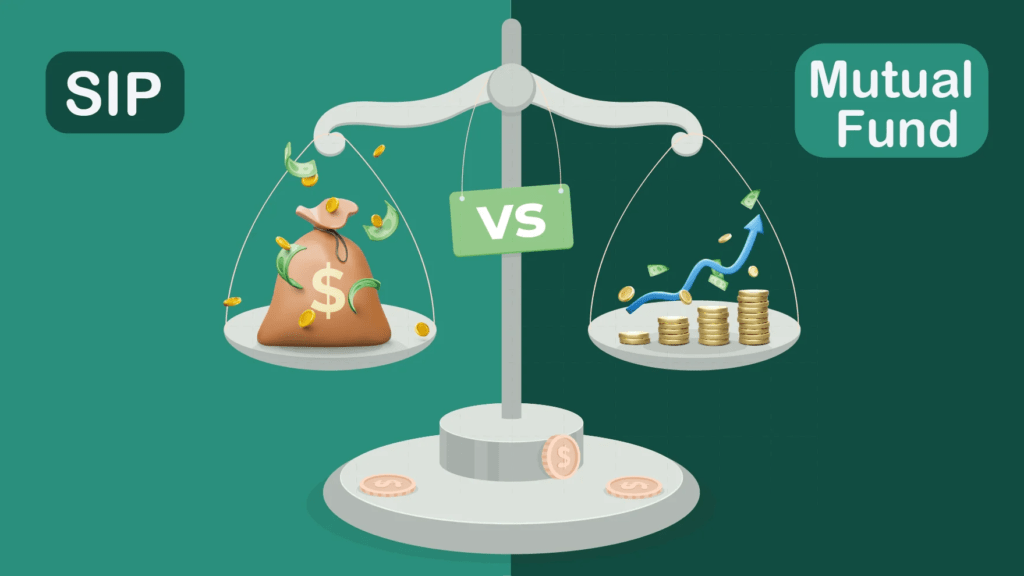Share This Article

Introduction:
Investing in SIP (Systematic Investment Plan) has gained popularity among investors looking to generate long-term wealth. While Mutual Funds have been the traditional choice, Stock SIPs have emerged as an alternative. Both options come with their own advantages and risks. In this blog, we will delve into the comparison between Stock SIPs and Mutual Fund SIPs to evaluate their risk levels and potential returns.
Risk Assessment:

- Stock SIPs: Investing in individual stocks through SIPs carries inherent risks since the performance of the stock market is unpredictable. Stock prices can fluctuate due to various factors such as market volatility, economic conditions, and company-specific news. If you lack in-depth market knowledge or are unable to diversify your portfolio effectively, the risks associated with Stock SIPs can be higher.
One major risk with Stock SIPs is the concentration risk. Investing in a single stock or a few stocks can expose you to significant losses if any of those stocks underperform or face adverse news. Additionally, stock prices can be influenced by external factors such as geopolitical events and global economic trends, making it challenging to predict reliable returns solely based on individual stock investments.
- Mutual Fund SIPs: Mutual Funds pool investments from multiple investors to invest in a diversified portfolio of stocks, bonds, or other assets. The risks associated with Mutual Funds are usually lower compared to Stock SIPs due to diversification. By investing in a variety of instruments, Mutual Funds aim to spread the risk across different sectors and asset classes.
Diversification helps in mitigating the impact of any individual stock’s poor performance. Professional fund managers handle portfolio allocation and can adjust investments according to market conditions, further reducing the risk. However, it is important to note that while the diversification in Mutual Funds helps lower risk, it does not eliminate it entirely. Market downturns can still lead to losses, but with proper diversification, the impact can be limited.
Returns Comparison:
- Stock SIPs: Investing in individual stocks through SIPs can offer higher returns compared to Mutual Fund SIPs. If you successfully pick growth-oriented stocks and time the market well, your portfolio can generate substantial returns. The potential for higher returns is often attractive to investors who are willing to take on greater risk.
However, it is important to acknowledge that consistently picking winning stocks is extremely challenging. Even seasoned investors and professionals often struggle to consistently beat the market. Market timing also becomes a significant factor, as investing at the wrong time can significantly impact your returns. Successful stock investing requires thorough research, analysis, and continuous monitoring of the market and individual stocks.
- Mutual Fund SIPs: Mutual Fund SIPs are known for their long-term wealth-creation potential. They offer the benefit of diversification, which reduces risk. Mutual Funds also provide exposure to a wide range of asset classes and sectors, which helps offset losses from underperforming investments.
While the returns may be comparatively lower than individual stocks, Mutual Funds focus on steady growth over time. The consistent nature of Mutual Fund SIPs helps investors avoid the volatility associated with investing in individual stocks. Additionally, Mutual Funds are managed by professional fund managers who have in-depth market knowledge and experience in managing portfolios. These managers conduct thorough research and analysis to make informed investment decisions.
The professional management of Mutual Funds gives investors access to expertise that might otherwise be difficult to achieve on an individual level. For those who are risk-averse or prefer a more passive investment approach, Mutual Funds can offer a reliable option to build wealth gradually.
Conclusion:
When it comes to determining the less risky option between Stock SIPs and Mutual Fund SIPs, it is evident that Mutual Fund SIPs have the advantage due to their diversified nature, professional management, and risk mitigation through portfolio allocation. On the other hand, Stock SIPs can offer higher returns if managed efficiently, but they come with greater risks due to market volatility and stock-specific factors.
Ultimately, the choice between Stock SIPs and Mutual Fund SIPs depends on your risk appetite, investment horizon, and market understanding. It may be wise to diversify your investments by including both options in your portfolio, carefully considering your financial goals and risk tolerance. Consulting with a financial advisor can provide personalized guidance suited to your investment needs, helping you make informed decisions for a balanced portfolio.


